Tech Diplomat Keith Krach Returns to Taiwan
08.08.23
Krach Institute Chairman and Former Under Secretary of State Reinforces U.S.-Taiwan Technological Partnership with New Initiatives to Advance Freedom

Krach Institute Chairman and Former Under Secretary of State
Reinforces U.S.-Taiwan Technological Partnership
with New Initiatives to Advance Freedom
WASHINGTON, DC & TAIPEI, TAIWAN – Keith Krach, former U.S. Under Secretary of State and Tech Diplomat, will return to Taiwan from August 9-12. The upcoming visit comes three years after his historic visit to Taiwan, as the highest-ranking State Department official in 40 years. Krach’s aim is to further boost the economic, scientific, and technological ties between Taiwan and the United States, demonstrating continued support for Taiwanese democracy.
“Throughout my tenure leading U.S. economic diplomacy, Taiwan was central to our Global Economic Security Strategy for three pivotal reasons: first, Taiwan is a beacon of democracy, inspiring nations worldwide; second, Taiwan’s remarkable technological innovations are a testament to the potential of a free society; and third, Taiwan is a true friend and an indispensable partner in championing freedom,” stated Chairman Keith Krach. “These very reasons underpin Taiwan’s critical role in the Krach Institute for Tech Diplomacy, Global Tech Security Commission, Global Trusted Tech Network, and as we launch the Taiwan Center for Innovation and Prosperity.”
During his stay, Krach will engage with senior Taiwanese government officials, tech industry CEOs, and academic leaders. His trip is focused on three primary objectives:
- Strengthening Global Tech Security: Krach co-chairs the Global Tech Security Commission, which brings together senior public- and private-sector leaders from the U.S. and technologically advanced democracies, including Taiwan, to create the definitive Global Tech Security Strategy (GTSS). The GTSS aims to unify like-minded countries, harness private sector innovation, and build the Global Trusted Tech Network to accelerate the innovation and adoption of trusted technology. Taiwan’s Digital Affairs Minister Audrey Tang is both a commissioner and the chairperson of the National Institute of Cyber Security.
- Launching the Taiwan Center for Innovation and Prosperity: A product of the Global Tech Security Strategy, the Center is being formed under the banner of the Krach Institute for Tech Diplomacy. The Center’s mission is to enhance Taiwan’s prosperity, international standing, and sovereignty by offering technological expertise and diplomatic reinforcement. The Center will bridge U.S. investment, talent, and expertise through its expansive private sector network. This initiative gained momentum following the recent visit to Purdue University by Ambassador Bi-khim Hsiao, Taiwan’s U.S. Representative, and Dr. Chi-Hung Lin, President of the National Yang Ming Chiao Tung University (NYCU). This partnership bore two significant MOUs, extensive collaboration between Purdue and NYCU in semiconductors, and between the Krach Institute and National Chengchi University (NCCU), a public research university in Taipei, to drive Tech Diplomacy.
- Expanding Taiwan’s Role in the Global Trusted Tech Network: During the visit, Krach will continue bolstering U.S.-Taiwan relations by broadening Taiwan’s participation in the growing Global Trusted Tech Network. This coalition comprising like-minded nations, companies, institutions, and global leaders works together to advance freedom through the innovation and adoption of trusted technology. Previously, as America’s top economic diplomat, Krach welcomed Taiwan into the Clean Network Alliance of Democracies; initiated the Lee Economic Prosperity Partnership; established the U.S.-Taiwan Science and Technology Cooperation Agreement; brokered the landmark $12 billion onshoring of TSMC to the U.S.; and architected the $280 billion bipartisan CHIPS and Science Act.
Building on the foundation of shared democratic values and Purdue University’s seven-decade-long history of engagement, Krach’s visit is a significant step in strengthening the bond between Taiwan and the U.S. by growing the economic and technological partnership. His tech diplomacy seeks to fortify Taiwan’s standing on the global stage and augment collaborative opportunities in critical high tech sectors, such as semiconductors.
About the Krach Institute for Tech Diplomacy at Purdue
The Krach Institute for Tech Diplomacy at Purdue is the world’s preeminent trusted technology accelerator. As the leader of the new category of Tech Diplomacy, the Institute integrates technology expertise, Silicon Valley strategies, and foreign policy tools to build the Global Trusted Tech Network of governments, companies, organizations and individuals to accelerate the innovation and adoption of trusted technology and ensure technology advances freedom.
Follow the Krach Institute for Tech Diplomacy at Purdue on Twitter, Facebook, LinkedIn, and YouTube. Subscribe to the Institute’s weekly newsletter Tech Diplomacy Now for the latest news at the intersection of high tech and foreign policy.
About the Global Tech Security Commission
The Commission consists of international and multi-sector leaders dedicated to protecting freedom via the innovation and adoption of trusted technology. GTSC’s charter includes forging a Global Tech Security Strategy, unifying like-minded nations, utilizing private sector innovation, building a Global Tech Trust Network, and establishing standards rooted in democratic principles.
For updates on GTSC, visit globaltechsecurity.com. Media inquiries should be directed to press@atlanticcouncil.org or techdiplomacy@prf.org.
About the Taiwan Center for Innovation and Prosperity
The Taiwan Center for Innovation and Prosperity aims to strengthen the technological and diplomatic capabilities of Taiwan and the U.S. by: (1) delivering access to best-in-class STEM talent, especially in advanced manufacturing, AI, and electric vehicles; (2) providing unique Tech Diplomacy expertise that integrates Silicon Valley strategies with foreign policy tools; (3) building a network of networks for industry and government collaboration; (4) facilitating the path to commercialization from research to application and business creation; and (5) strengthening research and development in secure microelectronics, hypersonics, and other emerging technologies.

